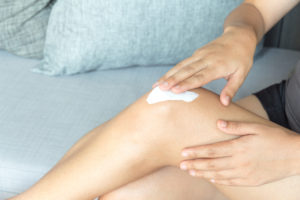A doctor answers 5 questions about dry skin
In the winter months, I wash my hands regularly and use a squirt of hand sanitizer from time to time in an effort to ward off colds. It may be a good health habit, but it also pretty much guarantees that I'm plagued by dry, cracked skin and tiny cuts around my fingers until spring.
Dry skin in the winter months is common, partly because people ramp up their hand washing, but the combination of cold air and the lack of humidity also plays a role. Your skin spends the winter months fighting to retain moisture, not to mention fending off other insults from cold-weather staples like scratchy wool clothes and crackling wood fires.
How can your skin survive the season? We asked Dr. Barbara Gilchrest, senior lecturer on dermatology, to weigh in with her best tips to help you protect your skin from winter dryness.
1. What's the most common winter skin problem?
For most people, it's dry skin and itching, says Dr. Gilchrest. You can blame cold air and low humidity for stripping the water away from the surface of your skin. Instead of lying flat and smooth and then shedding from the surface inconspicuously, dead skin cells from many layers that make up our protective skin barrier form small but visible partially attached clumps that make your skin feel dry and rough.
Eczema craquele is another problem to watch for in the winter months. It's essentially an extreme manifestation of dry skin, usually occurring on the lower legs. With this condition, the dryness actually causes cracks in the top layer of skin, known as the stratum corneum. Blood may rise up beneath the skin, appearing as squiggly red lines, which give the skin a mottled appearance. Some people with this condition experience itching and stinging.
2. How can you prevent dry skin in the winter months?
Combating the problem starts with keeping your home environment moist. Use a humidifier if you can. But the most effective strategy is to use skin moisturizers, which slow water loss and also physically smooth the skin, making it feel less rough, says Dr. Gilchrest.
3. Do you have any tips for choosing a moisturizer?
Choose the heaviest moisturizer that's comfortable to wear, and use more on your lower legs and hands, which are most prone to dryness. After a bath or a shower, pat the skin dry and immediately apply a moisturizer. Reapply as needed throughout the day, says Dr. Gilchrest.
4. Do expensive, brand-name moisturizers work better than lower-cost options?
"It doesn't have to be expensive to work," says Dr. Gilchrest. "To my knowledge, while there are some extremely expensive moisturizers, there are none that are proven to be magically better." But if you an, she says, look for moisturizers with alpha hydroxy acids, also called fruit acids, such as lactic acid or glycolic acid. Creams with alpha hydroxy acids tend to hold moisture in the skin longer than other moisturizers. You can get them at fairly high concentrations, she says. Use small amounts until your skin gets used to them, so you can apply them and they don't sting.
5. Any other winter tips you can offer?
Keeping the outer skin barrier well hydrated is crucial. Also, keep your skin covered in cold temperatures, and don't forget to wear gloves when you're out, says Dr. Gilchrest. For people with Raynaud's syndrome, where blood vessels in the fingers overreact to cold temperatures, gloves help prevent fingers from becoming painful and turning white, which happens more often in the winter. Keeping the hands warm can also ensure healthy nail growth during the colder months, she says.
In addition, as cozy as it may be, it's best to avoid sitting next to a fire or a radiator all day, because that type of direct heat can be damaging to your skin. Avoid super-hot baths for the same reason, says Dr. Gilchrest. Whenever possible, try to wear soft fabrics. Wool is warm, but it can scratch and irritate the skin. If you do wear wool when you go outside, be certain to remove it as soon as possible when you back inside, or layer it over softer fabrics.
With a little extra care, you'll be able to protect your skin from the effects of winter's chill.


Comments
Post a Comment